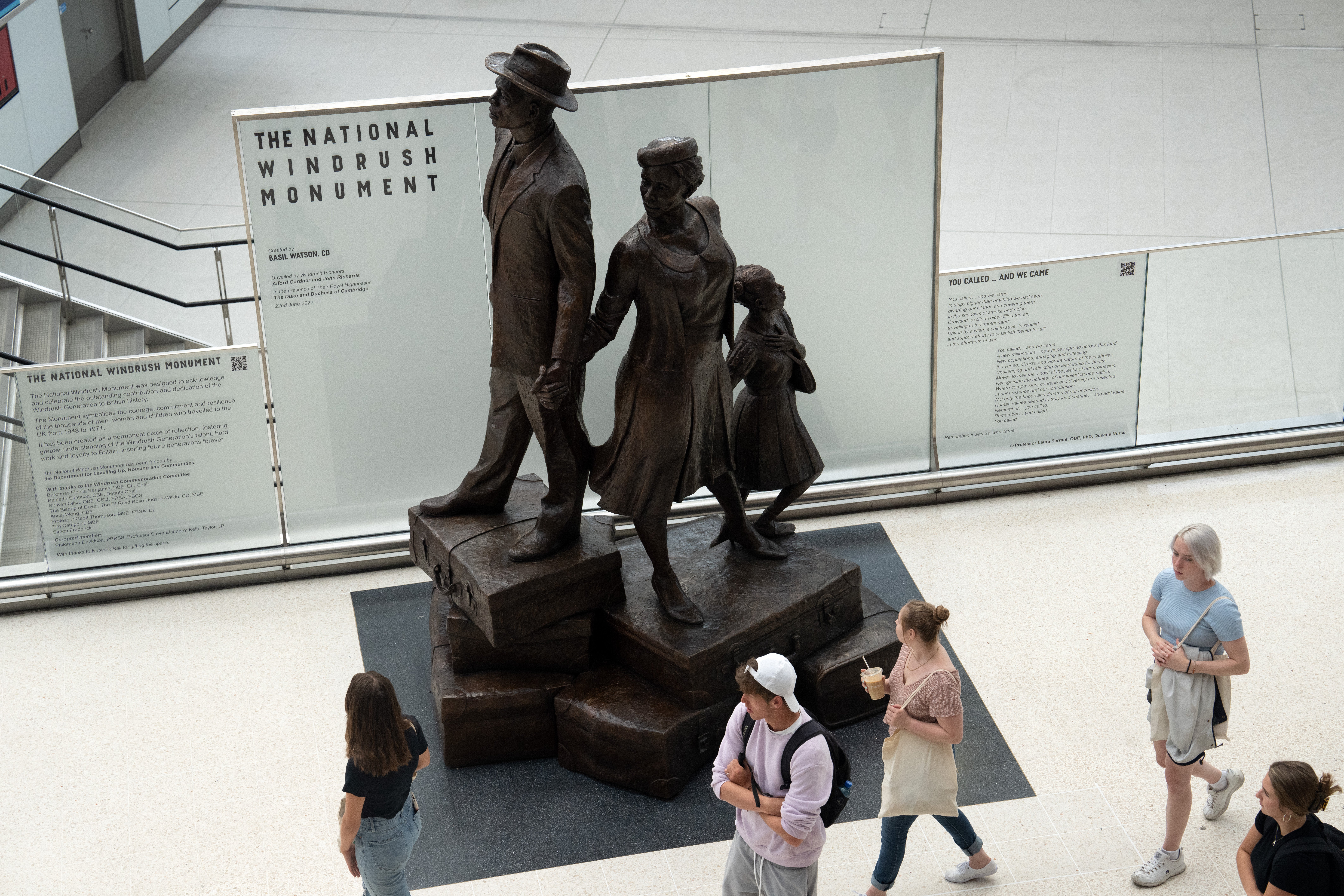How we mark the 75th anniversary of Windrush could unite Britain in 2023
It offers an opportunity to bridge polarised debates about how we commemorate our history, moving beyond arguments about which statues to take down, writes Steve Ballinger


The coronation of King Charles III in May this year may offer a weekend’s respite from what looks set to be a tough year for many, with a cost of living crisis and the economy heading into recession.
While the new King will be keen for this to be a forward-looking celebration, it will inevitably be a moment also to look back at the 70 years that have passed since we last crowned a new monarch; at all that has changed and at that which has remained constant, too.
This is also a year in which two major anniversaries will similarly offer a chance to reflect on our history and changing society. The 75th birthday of the NHS will be a moment to celebrate the achievements of an institution in which most of the public still takes immense pride – while also shining a spotlight on its struggles to cope with the aftermath of Covid and the demands of an ageing population.
This year also marks the 75th anniversary of the ship HMT Empire Windrush arriving in Tilbury on 22 June 1948, bringing 500 passengers from the Caribbean. It has since become a moment that symbolises the start of post-war Commonwealth migration to Britain and the shift towards the multicultural society of Britain today.
The anniversary offers an opportunity to bridge polarised debates about how we commemorate our history, moving beyond arguments about which statues to take down to examine how we could mark our shared history together. Properly commemorating the 75th anniversary of Windrush could help to deepen our understanding of the past, present and future of multicultural Britain.
Today, voices from across UK society – from sport and culture to politics, faith and business – are speaking out about why Windrush 75 matters and what they will be doing to mark the anniversary this year. Actor Lenny Henry, politicians David Lammy and Sajid Javid, the historian David Olusoga and Bishop of Dover Rose Hudson-Wilkin are among those showing their support for Windrush 75, alongside Windrush descendants and representatives of the NHS, the FA, England and Wales Cricket Board (ECB), Tesco and Royal Mail, with a set of special stamps coming out in June to mark the Windrush anniversary.
Little was heard about the Windrush for most of the four decades after its arrival. The 50th anniversary brought wider public attention, through a four-part BBC One series and accompanying book Windrush: The Irresistible Rise of Multi-Racial Britain by Mike and Trevor Phillips. Windrush Square was inaugurated in Brixton, in response to the successful efforts of the Windrush Foundation, co-founded in 1996 by Sam King and Arthur Torrington, to secure public recognition of the Windrush generation and their legacy.
Building on these foundations, Andrea Levy’s seminal 2004 novel Small Island, later adapted for stage and television, imagined the personal stories of those seeking a new life in Britain. A papier-maché Windrush, made up of newspaper headlines, formed part of Danny Boyle’s iconic opening ceremony to the London 2012 Olympics that charted our national story.
Yet the official governmental recognition of National Windrush Day in 2018, and indeed the National Windrush Memorial, unveiled at Waterloo Station in June 2022, came about in response to the Windrush scandal. That injustice arose from the failure of governments to properly document the status of pre-1973 arrivals to Britain, before failing to recognise their claims, four decades later, once they became caught up in efforts to create a more hostile environment for those without legal status. While over 8,000 people affected have had their status confirmed, the slow progress of the compensation scheme has struggled to secure the confidence of victims.
While there remains an ongoing need to address injustices, campaigners do not want to see the story of four generations of contribution and change in British society now told solely through the narrower lens of the Windrush scandal.
There are many meanings of Windrush. It is a foundational story about the Black Caribbean experience and of the Black British story; the symbolic origins story of post-war migration from the Commonwealth and beyond; and now an opportunity for this to be fully written into the national story as the history of modern Britain.
New attitudes research for the Windrush 75 network finds a broad public appetite and understanding of the call to mark the 75th anniversary. Some 61 per cent of the public agrees that “Britain owes a great deal to the Windrush generation of migrants and should recognise their contribution as part of our national story”. A similar six in 10 agree that the anniversary is “a chance to bring people from different backgrounds together to celebrate our shared history” and that it should be about more than history – it’s about understanding multi-ethnic Britain today and the future we share”.
It is also a chance to learn, and for children to fully understand why the multicultural mix in their classroom is rooted in Britain’s long history, from empire and colonialism to contributions in the world wars. Research finds that 62 per cent of the public agrees that the arrival of Windrush is a key moment in Britain’s history of migration and change and that it is important for integration today that all of our children are taught about the shared history of a multicultural Britain.
So the sustained legacy of Windrush 75 beyond 2023 may depend on whether the anniversary can be a foundation for educational resources that give schools the tools to fully engage with the place of race, empire and immigration in the making of modern Britain. Young people could also be engaged in efforts to increase contact between people of different backgrounds and generations, capturing the oral histories of the Windrush generation while this is still possible.
Elevating Windrush 75 and broadening its appeal to make it a truly national moment, fully recognising this Black history in the broader sweep of British history, will require an invitation for everybody to participate. The 75th anniversary offers opportunities for symbolic recognition – on coins and stamps – and in shifting the argument from how many statues to take down to which new ones we could put up.
It is an opportunity for national institutions, from the NHS and national broadcasters to sporting bodies, business, government and even the monarchy to help tell the story of the contribution of the Windrush generation, and the migration that followed, in shaping who we are today.
Steve Ballinger is director of communications for independent think tank British Future and a member of the Windrush 75 network






Join our commenting forum
Join thought-provoking conversations, follow other Independent readers and see their replies
Comments